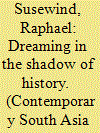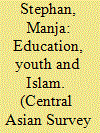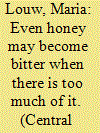| Srl | Item |
| 1 |
ID:
183482


|
|
|
|
|
| Summary/Abstract |
Spatial mobility is often considered on large geographical scales: people move from distant villages to global cities, they migrate from one country to the next, or even to a whole new continent. Such large-scale migration comes with shifts in economic position, social status and cultural exposure, shifts that condition new figurations of belonging – or so the argument goes. In contrast, I ethnographically follow the looping movements of three young men in Lucknow who aspire to migrate but remain stuck, who find a whole new world by crossing the river, whose small steps reflect big dreams. As the world grapples with ‘lockdowns’ and ‘stuckedness’ in the Covid-19 pandemic, I sketch their aspirations, mental maps and the material restraints that condition their trajectories. Through them, I demonstrate how looping micro-mobilities – cruising through the night, dancing on stage, riding one's bike – can be as effective in fostering new figurations of belonging as the grand movements emphasized in literature on migration. I further explore which spaces enable and contain such micro-mobilities, rediscovering the potency of urban settings to make people feel at home and out of place in small but important ways.
|
|
|
|
|
|
|
|
|
|
|
|
|
|
|
|
| 2 |
ID:
101298


|
|
|
|
|
| Publication |
2010.
|
| Summary/Abstract |
This article attempts to explain the growing popularity of private religious lessons in urban Tajikistan from a cross-generational perspective. By instilling discipline and good 'morals', religious lessons serve as a powerful tool to socialize adolescent and morally vulnerable urban youth into the established social order. The increasing demand for religious instruction on the part of Muslim parents not only reflects the growing importance of Islam in Tajikistan, but also highlights the weaknesses of state education and the constraints on family upbringing in neo-local urban households. By attending religious classes, male and female youth have found a space for negotiating religious identities and for realizing their own abilities and ambitions. Given the socio-economic hardships of everyday life in the post-Soviet city, a turn to Islam can promote integration, recognition and social mobility, and offer an alternative route for urban youth to become 'adults'.
|
|
|
|
|
|
|
|
|
|
|
|
|
|
|
|
| 3 |
ID:
126042


|
|
|
|
|
| Publication |
2013.
|
| Summary/Abstract |
In Kyrgyzstan, as in the rest of Central Asia, recent decades have witnessed a proliferation of distinctions between 'good' and 'bad' Islam. What is perceived as a growing 'religiosity' is often seen as a symptom of post-Soviet chaos and excess, but people equally tend to see Islam as an important source of well-being, for themselves and for society as such. It is argued that a general feature of the Islam many Muslims strive for - and occasionally experience glimpses of - is one that expresses, embodies and enables a balanced existence: a balance between well-being in this world and in the afterlife; a balance between the acceptance of one's fate and the attempt to improve one's situation; or a balance between adherence to abstract dogmas and respect for local moralities.
|
|
|
|
|
|
|
|
|
|
|
|
|
|
|
|